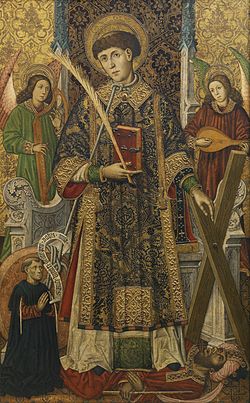
Spanish Deacon and Martyr,
Saragossa by Tomás Giner, 1462–1466
Vincent spent most of his life in the city of Saragossa, where he was born, educated and ordained to be a deacon by Bishop Valerius of Saragossa, who commissioned Vincent to preach throughout the diocese.
According to the legend, Valerius suffered from a speech impediment and used Vincent to speak for him. During the general persecution under Diocletian in the early 4th century, Dacian, the governor of Spain, had both Valerius and Vincent arrested. He then gave them the opportunity to save their lives by denying Christ and sacrificing to the gods. Speaking on behalf of his bishop, he informed the judge that they were ready to suffer everything for their faith, and that they could pay no heed either to threats or promises.
They were condemned: Valerius to exile, but Vincent because of his outspoken manner, so angered the governor that he ordered him tortured to death. He was stretched on the rack and his flesh torn with iron hooks. Then his wounds were rubbed with salt and he was then roasted alive upon a red-hot gridiron. Finally he was cast into prison and laid on a floor scattered with broken pottery, where he died. Throughout all this he preserved such peace and tranquillity that it astonished his jailer, who repented from his sins and was converted. Vincent’s cult spread quickly throughout the Christianised world of the time, and he was revered as a strong witness to the power of the gospel in the face of persecution.
BORN: 3rd Century,
Osca, Hispania Tarraconensis (Huesca, Aragon, Spain)
DIED: c. 304, Valentia,
Hispania Tarraconensis (Valencia, Spain)
 Welcome
Welcome Calendar
Calendar Today's Word
Today's Word Lauds
Lauds Terce
Terce Sext
Sext None
None Vespers
Vespers Compline
Compline Matins
Matins